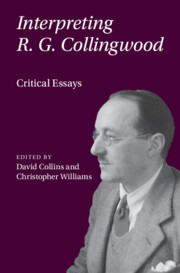Book contents
- Interpreting R. G. Collingwood
- Interpreting R. G. Collingwood
- Copyright page
- Contents
- Figures
- Contributors
- Acknowledgements
- Abbreviations
- Introduction
- Part I Situating Collingwood: Beyond Idealism
- Part II Issues in Collingwood’s Philosophy
- Chapter 7 Collingwood’s Logic of Question and Answer
- Chapter 8 Presuppositional Analysis and the Goal of Metaphysical Inquiry
- Chapter 9 Is Collingwood a Process Philosopher?
- Chapter 10 Collingwood on Imagination
- Chapter 11 Collingwood on “Painting Imaginatively” and the Expressive Nature of the Artwork
- Chapter 12 Collingwood’s Influence on Baxandall
- Chapter 13 “Reconsidering Questions of Principle”: Collingwood and the Revival of Celtic Art
- Chapter 14 What Is Living and What Is Dead in Collingwood’s New Leviathan?
- Bibliography
- Index
Chapter 9 - Is Collingwood a Process Philosopher?
The Libellus de Generatione’s Ontology of Becoming
from Part II - Issues in Collingwood’s Philosophy
Published online by Cambridge University Press: 22 November 2024
- Interpreting R. G. Collingwood
- Interpreting R. G. Collingwood
- Copyright page
- Contents
- Figures
- Contributors
- Acknowledgements
- Abbreviations
- Introduction
- Part I Situating Collingwood: Beyond Idealism
- Part II Issues in Collingwood’s Philosophy
- Chapter 7 Collingwood’s Logic of Question and Answer
- Chapter 8 Presuppositional Analysis and the Goal of Metaphysical Inquiry
- Chapter 9 Is Collingwood a Process Philosopher?
- Chapter 10 Collingwood on Imagination
- Chapter 11 Collingwood on “Painting Imaginatively” and the Expressive Nature of the Artwork
- Chapter 12 Collingwood’s Influence on Baxandall
- Chapter 13 “Reconsidering Questions of Principle”: Collingwood and the Revival of Celtic Art
- Chapter 14 What Is Living and What Is Dead in Collingwood’s New Leviathan?
- Bibliography
- Index
Summary
Suggestions of a processual orientation in Collingwood’s thought can be found in certain places in his corpus, but Collingwood is not generally known as a process philosopher. This is likely because the Libellus de Generatione, in which he develops a process-oriented ontology, has long been unavailable and thought lost. While a copy was found and is housed in the Bodleian Library, it was only made publicly available in 2019. This chapter explicates the process ontology developed in the Libellus and contextualizes it in relation to Collingwood’s wider corpus and to early twentieth-century process philosophy. Drawing on Sandra Rosenthal, I argue that Collingwood’s understanding of process is closer to Bergson’s than Whitehead’s, especially in ways that allow for genuine novelty and creation, and in its implications for the metaphysics of time. I then discuss implications of this process ontology for the view of Collingwood as an idealist and for other areas of his philosophy. Finally, I consider whether attributing a processual ontology to Collingwood is in tension with his own view of “metaphysics without ontology.”
Keywords
- Type
- Chapter
- Information
- Interpreting R. G. CollingwoodCritical Essays, pp. 161 - 183Publisher: Cambridge University PressPrint publication year: 2024

